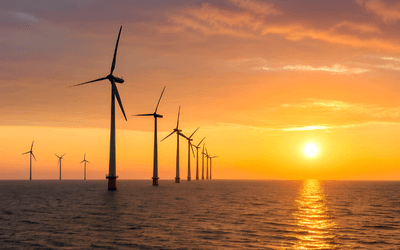As the UK intensifies its efforts to meet net zero targets and transition to a clean energy future, the role of environmental and sustainability (E&S) consultancy has never been more critical.
Across Europe, consultancy firms are evolving rapidly to meet the demands of climate legislation, ESG expectations, and green infrastructure development, but what lessons can the UK learn to follow suit?
In this blog we explore current and future trends in E&S consultancy across Europe, and the current state of play in the UK, to look into potential ways to accelerate Britain’s sustainability journey.
The European Environment and Sustainability Landscape:
Europe’s E&S consultancy sector is shaped by robust climate policies, cross-border collaboration, and a strong emphasis on ESG integration. Nations at the forefront of shaping the landscape, such as Germany, France, and the Nordics have embedded sustainability into their industrial strategies, driving demand for consultancy services in a variety of specialisms and sectors. These include:
-
Renewable energy deployment
-
Circular economy models
-
Sustainable urban planning
-
Climate risk and biodiversity assessments
The EU’s Corporate Sustainability Reporting Directive (CSRD) and the Green Deal have catalysed a surge in the need for sustainability reporting and advisory services. In response, consultancies are increasingly offering integrated solutions that combine technical expertise with strategic ESG advisory, helping clients navigate complex regulatory landscapes and stakeholder expectations.
Environment and Sustainability in the UK: A Sector in Transition
The UK’s environment and sustainability (E&S) consultancy market is experiencing steady growth, with expenditure projected to almost double by 2027. Despite this promising trajectory, the sector is confronted with a series of distinctive challenges.
Economic uncertainty and frequent political and policy shifts have contributed to volatility in demand, making it difficult for consultancies to plan with confidence. While the UK’s net zero targets remain legally binding, there is increasing political debate regarding their feasibility, further complicating the landscape. The drive for new consultancy projects is primarily fuelled by the growth of renewables and energy transmission, but expectations around profit margins and overall sector growth remain cautious.
Notably, Environment Analyst’s 2024 UK report revealed that small and mid-sized consultancies have been hiring at rates up to three times faster than their larger counterparts. This trend points to a decentralised momentum in efforts to achieve sustainability objectives. However, despite these advances, forecasts suggest the UK will trail behind emerging markets in Latin America and the Middle East & Africa when it comes to overall growth in the E&S consultancy sector.
Key Differences and Lessons from Europe
Policy Stability and Long-Term Planning
European countries benefit from consistent climate policy frameworks. The UK can learn from this by ensuring long-term policy stability to attract investment and foster innovation in consultancy services.
Integrated ESG and Technical Services
European consultancies often blend ESG strategy with technical environmental services. UK firms should adopt similar models to provide holistic solutions that align with investor and regulatory expectations.
Cross-Border Collaboration
Pan-European projects encourage knowledge sharing and innovation. The UK could benefit from deeper collaboration with EU partners, especially in areas like offshore wind, hydrogen, and biodiversity.
Bridging the Green Skills gap for future environmental sustainability
One of the most pressing issues across the globe, including Europe and the UK, is the green skills gap. As pressure increases to meet net zero, climate and environmental targets, the demand for sustainability expertise is outpacing supply. In the UK alone, it is believed up to 400,000 skilled workers are needed to meet its energy transition goals.
Environment Analyst’s report highlights that the E&S sector reported its lowest global net employee growth in three years in 2024, with staff turnover improving, but layoff expectations rising. As competition for talent increases, consultancies must invest in:
-
Upskilling existing staff through targeted training
-
Attracting new talent via apprenticeships and graduate schemes
-
Leveraging technology like AI and VR for immersive learning experiences
Europe is also grappling with this challenge. The green talent supply increased by only 5.6% compared to an 11.6% rise in demand, with a projected 101.5% gap by 2050.
Looking Ahead: Strategic Recommendations for the UK
The UK stands at an important moment in its sustainability journey, and the steps taken next could prove integral where the journey leads to in the coming years. By learning from Europe’s integrated, forward-thinking approach to environmental consultancy, and addressing its own skills and policy challenges, the UK can build a resilient, innovative consultancy sector that drives progress toward net zero and beyond.









